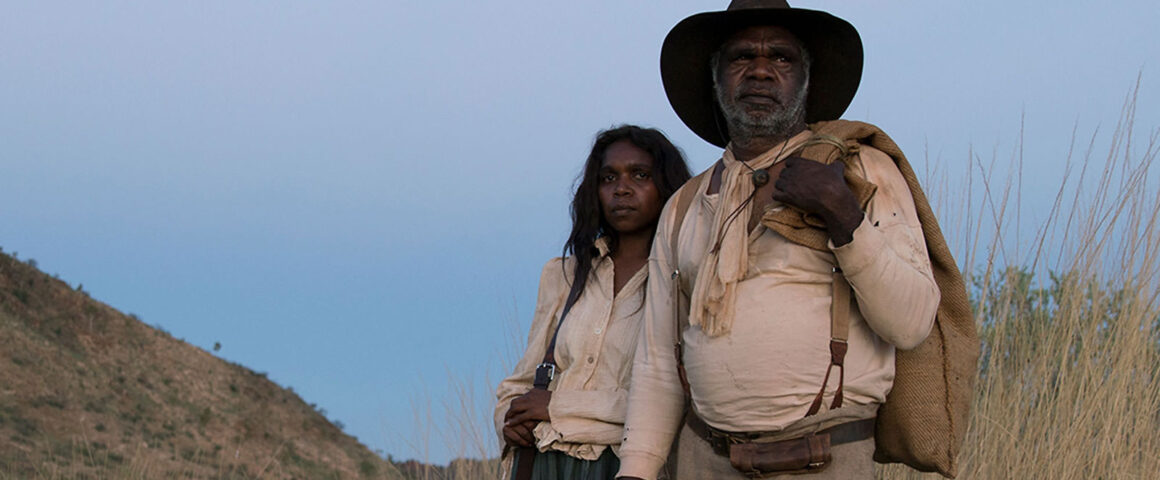In the film, Sweet Country, set in the bleak Northern Territory of Australia of the 1920s, there is a brief interchange between a hard-working, though weary and aging Archie (Gibson John), an Aboriginal cattle hand, and a wayward teenage Aboriginal Philomac (played by the twins, Tremayne and Trevan Doolan). Archie lectures the boy about their plight: “Water has dried up around here . . . No love of culture . . . How is a man to perform ceremony? I can’t sing, can’t sing songs to bring the rain.” Indeed.
The plot of this Western-styled tale focuses on Sam Kelly (Hamilton Morris, “8MMM Aboriginal Radio” TV series), a soft-spoken Aboriginal worker who is being hunted by Sergeant Fletcher (Bryan Brown, “The Light Between Oceans”), a bitter, unrelenting local law enforcer for allegedly murdering a “whitefella.” However, it is the land itself and the local culture that has arisen from it that seem to be the major protagonists. In a bleak, unforgiving desert outpost, a town called “Henry,” neither the white men nor the indigenous “black hands” have anything to look forward to other than the difficult labor of cattle ranching with intermittent breathers spent at the local tavern, a place that serves as town square, hang-out, and watering hole. Here, Archie’s description of Aboriginal life can be applied to the milieu of the white locals. They get drunk and rowdy, but none of them sing or dream.
Sweet Country marks a return to the theme of the clash between Aboriginal and European cultures that Warwick Thornton, the film’s director, addressed in “Samson & Delilah.” However, in Thornton’s new film, wherein he brings to life a spare, authentic screenplay authored by Steven McGregor and David Tranter, the struggle is even harsher. Racism is blatant and acceptable, perpetuated by a few hard scrabble ranchers who live by a creed where justice is local and civil right laws don’t apply. Add these ingredients to the pressure of living with scarcity and with suggestions that some ranchers bear shellshock scars as a result of the Australian army’s shattering experiences in World War I, and you end up with a setting that suggests the air itself conducts friction that could explode at any moment. The film’s opening shot, a close-up of a pot of boiling water, forewarns of this possibility. It is soon achieved when Harry March (Ewen Leslie, “Sleeping Beauty”), a well-armed and emotionally troubled rancher, hunts for the young Philomac, who apparently has stolen his watch. The incident leads to March’s shooting death at the hands of Archie, a dutiful ranch hand. The story proceeds with a hunt for Archie, and the ensuing quest for justice initiated by Judge Taylor (Matt Day, “Wolf Creek” TV series), whose legal authority — as he reminds the town folk — has been conferred by the Queen.
The film closely follows the template of the Western genre’s popular theme of frontier justice. But it is the masterful cinematography realized by both Dylan River and Warwick Thornton (a cinematographer as well as a director) that makes Sweet Country a compelling and exceptional film. The camera pares down the wide, desolate terrain, often achieving a claustrophobic effect. Extended still shots are positioned so that the land appears so overbearing that it would break the will of the most passionate pioneer. When the camera captures the sparse town center, it limits space and action by framing through windows and doorways. Other times, the camera focuses on a specific object, like a pot, a watch, a cooked chicken leg, so as to emphasize that in a world of scarcity, every personal possession becomes imbued with monumental importance. Even when the setting shifts to the outback, the camera often tilts downward to wall in the environment, and in turn, the emotions of the characters. In the few shots that open up to reveal the breadth of the countryside, the contrast inspires a vision of a “sweet country.”
It is evident that Warwick Thornton understands that oppression creates tension, and tension creates a story. This external pressure exacerbates the prejudice and anger of Sergeant Fletcher and head rancher Mick Kennedy (Thomas M. Wright, “Everest”) in their attempt to capture Archie. It also intensifies the fear of “whitefellas” that is already instilled in the Aboriginal characters. Only Fred Smith (Sam Neill, “Hunt for the Wilderpeople”), a ministerial, Christian presence, seems able to hold steady as a force of reason who attempts to arbitrate deep-seated hostilities in a powder-keg situation. Smith’s role is small, but essential. It provides a means for the film to ask whether a voice of sanity and decency can temper a Wild West culture. It’s hard not to infer that it’s also raising the question of whether more of us than we think still live in the Wild West, still seeking a “Sweet Country.”



